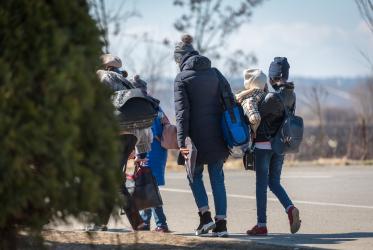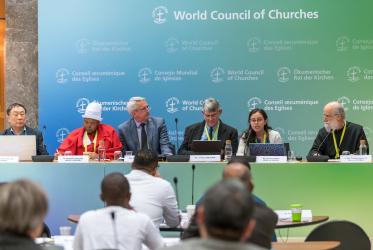The Cairo Declaration of religious leaders in the Arab states in response to the HIV/AIDS epidemic
Cairo, Egypt
11-13 December 2004
We, the Muslim and Christian leaders, working in the field of HIV/AIDS in the Arab world, meeting in Cairo, Egypt - from the 28 - 30 Shawal 1425 H. 11 - 13/12 2004 AD, in an initiative of the United Nations Development Programme's (UNDP) HIV/AIDS Regional Programme in the Arab States (HARPAS), under the auspices of the General Secretariat of the League of Arab States, and in collaboration with UNAIDS and FHI/Impact, have agreed upon the following:
First: General Principles
Due to our realization of the value of every human being, and our awareness of God's glorification of all human beings - notwithstanding their situation, background or medical condition - we, as religious leaders, face the imminent danger of the HIV/AIDS epidemic and have a great responsibility and duty that demands urgent action.
It is our duty to promote virtue and religious values and enhance people's relationship with their Creator, seeking God through prayers and petitions that He may protect us from this imminent danger and preserve our homeland from it, and that He may grant his grace and favor upon those affected by this disease. We stand in solidarity with those who are infected with this disease, and we encourage them to pray and receive God's help and grace.
Illness is one of God's tests; anyone may be afflicted by it according to God's sovereign choice. Patients are our brothers and sisters, and we stand by them seeking God's healing for each one of them.
Second: On Prevention
The family is the foundation for building and defending society. It is therefore necessary to encourage starting families in accordance with heavenly decrees, and we should remove all obstacles in the way.
We emphasize the need to break the silence, doing so from the pulpits of our mosques, churches, educational institutions, and all the venues in which we may be called to speak. We need to address the ways to deal with the HIV/AIDS epidemic based upon our genuine spiritual principles and our creativity, and armed with scientific knowledge, aiming at the innovation of new approaches to deal with this dangerous challenge.
We reiterate that abstinence and faithfulness are the two cornerstones of our preventive strategies but we understand the medical call for the use of different means to reduce the harm to oneself and others.
We view as sinful anything that may cause infection through intention or negligence - as a result of not using all possible preventive means available.
We emphasize the importance of reaching out to vulnerable groups which are more at risk of being infected by HIV/AIDS and/or spreading it, including commercial sex workers and their clients, injecting drug users, men having sex with men, and those who practice harmful behaviors. We emphasize the importance of diverse approaches and means to reach out to those groups, and although we do not approve of such behaviors, we call on them to repent and ask that treatment and rehabilitation programs be developed. These programs should be based on our culture and spiritual values.
We call upon the media to abide by ethical codes regarding the material they present.
We advocate the rights of women to reduce their vulnerability to HIV/AIDS.
Third: On Treatment and Care
People living with HIV/AIDS and their families deserve care, support, treatment, and education, whether or not they are responsible for their illness. We call for our religious institutions, in co-operation with other institutions, to provide spiritual, psychological, and economic guidance and support to those in need. We also encourage them not to lose faith in God's mercy, and aspire to a rewarding and productive life, embracing fate with courage and faith.
The Cairo Declaration of religious leaders in the Arab states in response to the HIV/AIDS epidemic
Cairo, Egypt
11-13 December 2004
We, the Muslim and Christian leaders, working in the field of HIV/AIDS in the Arab world, meeting in Cairo, Egypt - from the 28 - 30 Shawal 1425 H. 11 - 13/12 2004 AD, in an initiative of the United Nations Development Programme's (UNDP) HIV/AIDS Regional Programme in the Arab States (HARPAS), under the auspices of the General Secretariat of the League of Arab States, and in collaboration with UNAIDS and FHI/Impact, have agreed upon the following:
First: General Principles
Due to our realization of the value of every human being, and our awareness of God's glorification of all human beings - notwithstanding their situation, background or medical condition - we, as religious leaders, face the imminent danger of the HIV/AIDS epidemic and have a great responsibility and duty that demands urgent action.
It is our duty to promote virtue and religious values and enhance people's relationship with their Creator, seeking God through prayers and petitions that He may protect us from this imminent danger and preserve our homeland from it, and that He may grant his grace and favor upon those affected by this disease. We stand in solidarity with those who are infected with this disease, and we encourage them to pray and receive God's help and grace.
Illness is one of God's tests; anyone may be afflicted by it according to God's sovereign choice. Patients are our brothers and sisters, and we stand by them seeking God's healing for each one of them.
Second: On Prevention
The family is the foundation for building and defending society. It is therefore necessary to encourage starting families in accordance with heavenly decrees, and we should remove all obstacles in the way.
We emphasize the need to break the silence, doing so from the pulpits of our mosques, churches, educational institutions, and all the venues in which we may be called to speak. We need to address the ways to deal with the HIV/AIDS epidemic based upon our genuine spiritual principles and our creativity, and armed with scientific knowledge, aiming at the innovation of new approaches to deal with this dangerous challenge.
We reiterate that abstinence and faithfulness are the two cornerstones of our preventive strategies but we understand the medical call for the use of different means to reduce the harm to oneself and others.
We view as sinful anything that may cause infection through intention or negligence - as a result of not using all possible preventive means available.
We emphasize the importance of reaching out to vulnerable groups which are more at risk of being infected by HIV/AIDS and/or spreading it, including commercial sex workers and their clients, injecting drug users, men having sex with men, and those who practice harmful behaviors. We emphasize the importance of diverse approaches and means to reach out to those groups, and although we do not approve of such behaviors, we call on them to repent and ask that treatment and rehabilitation programs be developed. These programs should be based on our culture and spiritual values.
We call upon the media to abide by ethical codes regarding the material they present.
We advocate the rights of women to reduce their vulnerability to HIV/AIDS.
Third: On Treatment and Care
People living with HIV/AIDS and their families deserve care, support, treatment, and education, whether or not they are responsible for their illness. We call for our religious institutions, in co-operation with other institutions, to provide spiritual, psychological, and economic guidance and support to those in need. We also encourage them not to lose faith in God's mercy, and aspire to a rewarding and productive life, embracing fate with courage and faith.




